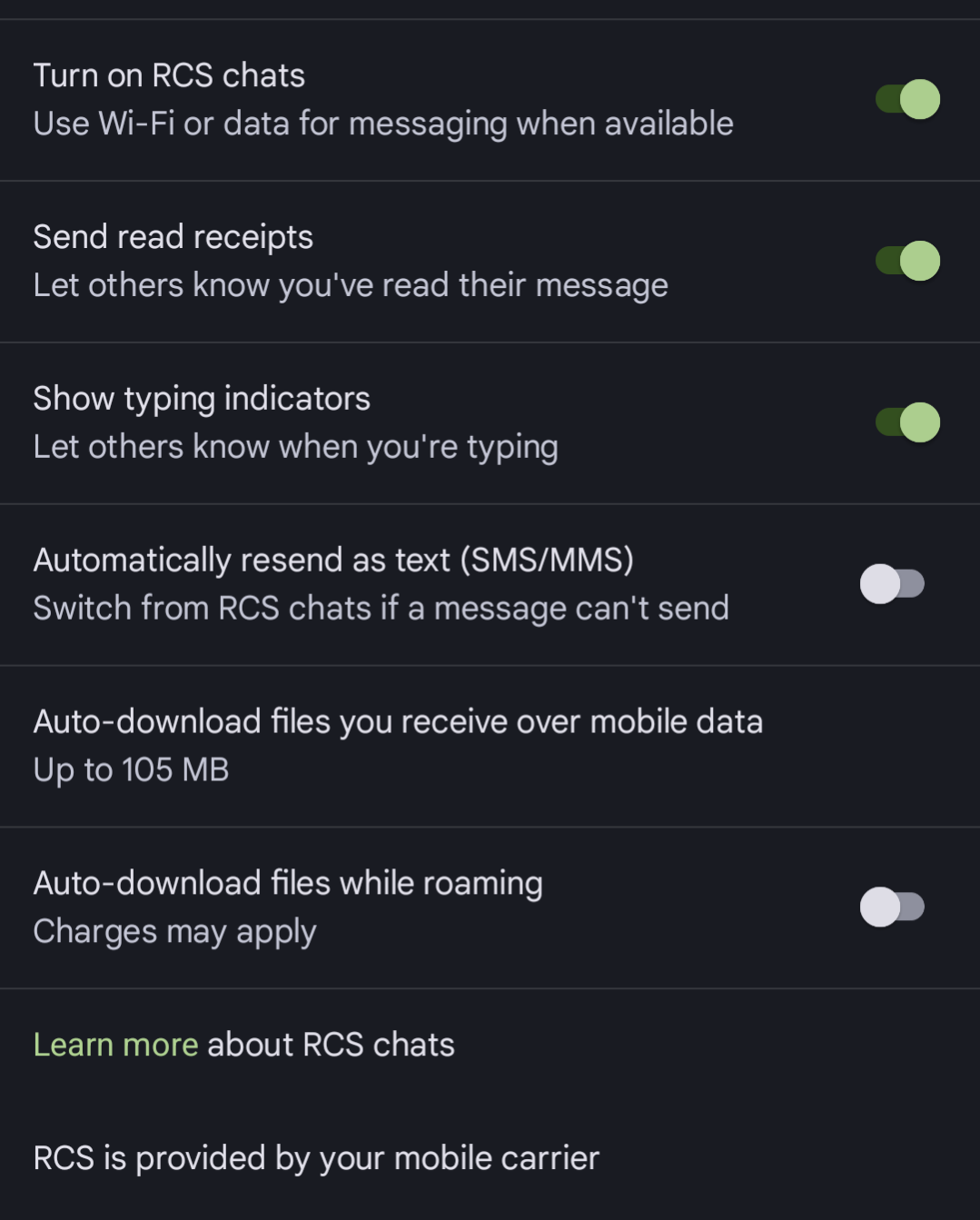They’ve stated that they are using Mac minis as relays. They claim that they do not store messages or credentials, but I don’t see how that’s possible if it relies on a Mac or iOS relay server that they control.
The best they can do is pinkie-promise to not intercept your messages and send a copy to law enforcement. But Nothing Corp can only guarantee… Nothing.
And yet, this article acts as if you’re using end-to-end encryption:
messaging Android users will use encrypted RCS chats, while messaging iPhone users will use encrypted iMessage chats.
They might be able to relay them in a way that the end to end encryption is actually handled on the phone and the relay only relays encrypted messages.
That would likely still give them a capability to MitM but it’s plausible that they couldn’t passively intercept the messages.
On second thought… Wouldn’t they have to reverse engineer at least part of the application, and at that point, would they even need Macs?
Absolutely. The iMessage network isn’t some unknowable beast, it “just” requires an Apple device be involved and activated to work. In order to spoof that far, you’d essentially need to emulate quite a bit on device.
I have experimented a little bit with Intel Hackintoshes, and iMessage has been one of the more difficult components of the process. If they truly managed this reverse engineering, they’d really be opening Pandora’s Box with Apple… Maybe in a legal sense.
I don’t think I would trust Nothing to develop this software and just hand it out for free on their hardware. “Software (Hardware?) as a Service” is bad enough, but this seems like it could be legally fraught.
You give them the credentials for your Apple account. The security concept is “trust me bro” and that’s really the best they can do unless Apple helps them (which they have no reason to)
“Trust me bro” is always the security concept of any service where you don’t control the client - that includes regular iMessage (you have to trust Apple) and Google’s RCS (you have to trust Google). They can always instruct or update the client apps on people’s phones to start doing something they weren’t previously doing.
That being said, I would not trust some random sketchy company with something so important. Even if you trust their intentions, you cannot trust their competence in preventing breaches. Stuff gets hacked and leaked all the time.
They might be able to relay them in a way that the end to end encryption is actually handled on the phone and the relay only relays encrypted messages.
They’d need to control the app on both phones in order to control what it’s encrypting/decrypting. Their system only works because they’ve got a device in the middle separately decrypting/re-encrypting each message. Google’s Messages app can’t read iMessages; Apple’s Messages app can’t read Google’s proprietary encrypted RCS messages.
Of course if you want universally cross-platform messaging, complete with full-resolution photos and available with end-to-end encryption, there’s this crazy new technology called “email.” I feel like there’s a missed opportunity for making setting up S/MIME easier.
It’s true I am assuming, but I’m basing my assumptions on existing open source projects that allow you to “hack” iMessage texts onto Android by setting up your own Mac Mini.
I can’t even start to imagine how they would use the Mac as only a partial relay that would be married to a particular Android device in order to only decrypt iMessages on it. Maybe they figured it out, but if they did, I would want it open source, with as many pairs of eyes on it as humanly possible!
If it’s anything like Beeper 's Matrix bridge then it’s E2EE Matrix encrypted between your device and the bridge server and then using Apple’s iMessage encryption between the bridge server and Apple/the other user.
The weak point is always going to be the bridge software as by necessity the message must be decrypted there to re-encrypt for iMessage.
At least in Beeper/Matrix the bridge software is open source and one can host their own bridge while continuing to use the existing Beeper/Matrix main server.
Doing so gives you no-trust security since the Beeper/Matrix host cannot decrypt the messages between you and the bridge you control and rubbing your own bridge eliminates that weak point.
They use a Mac mini somewhere to route these messages. So you’re logging into that Mac mini with your iCloud credentials. Sounds like a privacy/security nightmare and creepy as fuck.
It seems like all efforts to “bridge” imessage to anything outside apple software work this way - there’s a Matrix bridge and a dedicated open source app and they both rely on the imessage client on a mac. Is there a legitimate reason for it not being reverse-engineered yet?
Is there a legitimate reason for it not being reverse-engineered yet?
The actual protocol isn’t a secret. It’s that the authentication of the device relies on a hardware key, and that key is fully locked down by Apple (as it also secures the user’s biometric logins, keyring, financial information in Apple Wallet, etc.).
If it relies on a hardware key then why is it that I can get the same setup working with a macos virtual machine?
Using [BlueBubbles] (https://bluebubbles.app/) for anyone wondering.
I use beeper (a version of these apps that is actually released but kinda shit) and it’s perfectly fine. Their solution would be better because it runs locally on the phone, however it’s only on supported phones which is most likely just nothing phones.
More likely just a Linux VM
iMessage only runs on Apple products
…or a virtualized Apple product on a Linux machine. iMessage doesn’t know the difference.
I predict one of two outcomes once Apple becomes aware of this. Either they’ll modify the iMessage protocol to break Nothing Phones compatibility, or they’ll sue Nothing Phone for violating some kind of IP law. Apple absolutely wants to maintain their walled garden and letting a non-Apple product transparently interact on equal footing with Apple products runs counter to that.
Outcome 3: they buy whatever company is responsible for creating this compatibility layer, slowly integrate it so they can skate past several international regulations/lawsuits trying to open iMessage, and declare victory.
Why would they buy a company that is using a workaround when they could just make an iMessage app for android
Because that’s not their goal, they absolutely don’t want iMessage to work on Android, at least not without severe limitations. They want Android to look like a second class citizen. If they bought the intermediary company it would be with the intent of strangling it not expanding it. They’ll just slow walk the murder so that regulators don’t take too much notice.
For one: it helps them avoid any adjudication that would force them to do just that while avoiding admitting they have the ability to.
Nah, Apple doesn’t care.
These bridges like the ones found in Beeper/Matrix require a Mac server to perform the handshake with Apple’s.
As long as these servers require Apple hardware to function Apple is making money.
It’s roughly equivalent to running iMessage on your Mac at home and making an Android/PC app that remotely sends/receives messages to/from that iMessage app on your Mac.
Nah, if it gets big enough, Apple will care. They literally said (based on court document) that iMessage on Android is a horrible idea because it’ll make it easier for people to switch platform.
The messaging is provided by a third party who is dedicated to working on their iMessage compatibility. Apple has no reason to stop this because this is a good move for them in the larger battle between mobile messaging standards.
Google owns Jibe, the company behind RCS messaging found on all Android phones and an emerging, competent product from the only game in town that can compete with Apple. Google has decided to take this to the government level and push for a unified phone messaging standard, normally a good thing, but proposed their own RCS solution. The one they own and whose servers Google scrapes for user info.
Apple is pushing iMessage as a protest against Google and their inevitable lawsuit to conform with RCS adoption. Android may win unless Apple shows it has parity and provides a non-legislative option: if enough people use iMessage then governments don’t have to make any laws or enforce changes. The company Nothing is using iMessage, which helps Apple prove there is both a significant user base, which would cause a burden on Apple and it’s customers to change, and there is no monopoly on iMessage or messaging in general. So if enough people use iMessage, Apple sees it as a good thing.
RCS is not a Google product, see https://en.m.wikipedia.org/wiki/GSMA
Apple has been pushing iMessage for quite some time, but they want to keep it just to their platform and have made no attempt to make it open to other users. That’s Apples way and it’s not as a “protest” to Google lol
That’s like saying they made the lightning port as a protest to USB standards, nah they just want their proprietary shit.
Google’s RCS service is unique in that it is not telecom based. I would advise looking at the RCS Wikipedia article here.
Can you please point to me where it states Googles “version” of RCS can’t also interface with telecom based RCS?
Because it seems from my reading the Google just has some enhanced features on top of RCS (like e2e encryption) when both sides are through Google, but that doesn’t mean it doesn’t work with telecoms as well, unlike Apples walled garden of iMessage which doesn’t work with anything else lol.
Google RCS was designed to be interoperable. Apple iMessage was not.
And…? I don’t get your point, that’s what I’m arguing, Apple specifically made iMessage unable to interact with anything else intentionally, they very well could have figured out a way to bring it to other platforms but specifically chose not to.
No worries, I’m just sharing information and answering questions. Not trying to argue a point.
Reasons why Apple iMessage does not support RCS has way too much speculation around it from what I’ve briefly read so I prefer not to comment.
Apple’s ideology behind not expanding iMessage to other platforms has been - at least in part - due to the security of the iMessage platform and how it authorizes senders and recipients (like many encrypted services on Apple devices, tokens are encrypted/decrypted in the Secure Enclave on the SoC). Apparently, Apple has low confidence in the diaspora of Android devices and just decided to forget even trying to create a client for Android it could tie down to hardware authentication due to not having a reliable hardware base. This was many years ago.
I don’t know if this is still true or even necessary today, or if they’ve even bothered to explore it recently, but that’s Apple’s main issue. Sure, it also benefits them in other ways such as driving users to their platforms, but this is their main issue.
Not according to the leaked emails… https://x.com/TechEmails/status/1589450766506692609?s=20
Also, the secure enclave wasn’t added until the iPhone 5s in 2013, whereas iMessage had already existed as of 2011.
Clearly they also saw the benefits of keeping it to Apples platforms, but that doesn’t remove the technical limitations, at least, early on.
Like I said, I don’t know if those limitations still exist. Clearly, the profit motive would if it weren’t for all of the legal and regulatory liabilities that exist abroad. This is why I suggested in another comment that purchasing and integrating this compatibility layer would be a good workaround for them in that regard.
The limitation was added after the fact anyway, like I mentioned in my edit, secure enclave wasn’t added until the A7 chip, which was first used in the iPhone 5S in 2013, two years after iMessage became available.
Although true, it was added to make iMessage (and every other service) more secure, not just as some sneaky way to keep iMessages off android devices.
That’s like saying they made the lightning port as a protest to USB standards, nah they just want their proprietary shit.
They wanted a new, compact, durable, reversible plug for their mobile devices. There was no industry-standard option that met their requirements, so they made their own. If USB-C had existed at the time, they would have used it (though as a physical connector, Lightning is still just plain better).
Do you really think that?
Back when that would’ve been a good argument… but why then when USB-C did become a thing, and became robust and well-supported enough that even Apple used it on every other device they sold, didn’t they adopt it onto the IPhone despite lightning being an inferior standard in basically every way?
Why did they literally have to be forced by the EU to adopt the very standard they helped to create, a standard that was de-facto almost everywhere else?
Because they wanted that sweet, sweet proprietary monopoly. Plain and simple, the rest is just excuses.
Back when that would’ve been a good argument… but why then when USB-C did become a thing, and became robust and well-supported enough that even Apple used it on every other device they sold, didn’t they adopt it onto the IPhone despite lightning being an inferior standard in basically every way?
What’s the advantage of using USB-C? Because it’s a standard, right? A standard means wide support and it works with what you already have. Except Apple had effectively already established that with Lightning. It was in hundreds of millions of devices before USB-C became mainstream. Sure USB-C was nominally standard, but Lightning maintained the advantages for Apple’s customers as a de facto standard. The switch to USB-C meant buying new cables, while Lightning meant using the cables you already had.
Which is literally exactly what Apple did when they moved from the older connector to lightning in the first place lol.
What’s the advantage of using USB-C? Because it’s a standard, right?
Other than support for superior data transfer speeds, energy carrying ability, and durability? Yeah, it would be that it is an almost universal standard outside of the Iphone.
A standard means wide support and it works with what you already have. Except Apple had effectively already established that with Lightning. It was in hundreds of millions of devices before USB-C became mainstream.
For well-established standards this is correct, but every standard has to start out somewhere, and you’ll find once upon a time lightning was faced this exact same argument.
Sure USB-C was nominally standard, but Lightning maintained the advantages for Apple’s customers as a de facto standard.
A defacto standard for more or less only Iphones, as Apple switched almost all of their other products to use USB-C once it reached mass adoption.
You’ll find that being locked into Apple’s proprietary charging standard maintained a much larger advantage for Apple than it did their customers in allowing Apple to demand royalties/licensing fees from any 3rd parties that wanted to make charging accessories.
The switch to USB-C meant buying new cables, while Lightning meant using the cables you already had.
You could make this argument against the adoption of any new standard, again baring in mind that once upon a time lightning stood was the new standard that faced this exact criticism.
Also, had Apple just allowed other manufacturers to make use of lightning as a standard, you wouldn’t even need to worry about this right now - thus this is a rod for Apple’s own back, which they won’t mind since they already got off with the money.
Other than support for superior data transfer speeds, energy carrying ability, and durability? Yeah, it would be that it is an almost universal standard outside of the Iphone.
I specifically said the physical design of Lightning is superior
A defacto standard for more or less only Iphones, as Apple switched almost all of their other products to use USB-C once it reached mass adoption.
The iPhone and all of Apple’s accessories (such as AirPods) used Lightning up until a couple of months ago. The keyboards and mice still use Lightning. A connector used on well over a billion devices has all of the practical advantages for consumers of being a standard even if it’s nominally proprietary.
You could make this argument against the adoption of any new standard, again baring in mind that once upon a time lightning stood was the new standard that faced this exact criticism.
Yes, which is why companies should always be reluctant to change unless the new option is significantly better. Lightning was way better than anything else available and was worth the inconvenience of the change. The benefits were real and obvious to all users. The transition to USB-C is … less compelling for users.
I don’t buy this argument at all, they could have contributed towards a combined connector with the usb-if, but instead they made their own proprietary connector.
They did contribute towards usb c. And lightning came out years before c did. They had promised to only switch connectors once a decade because people got so mad about the switch from the thirty pin to the lightning.
Source for them contributing towards USBC prior to implementing lightning port?
Weird request when USB-C was released 2 years after lightning.
they could have contributed towards a combined connector with the usb-if
There was already one in the works but it was still years ago. They wanted to ditch the dock connector and didn’t want to wait forever.
Lightning came out in 2012, USB-C came out in 2014, not exactly “forever”
This is just cope man come on
Yes, that’s two years, and we’re also needing to look at hardware engineering decisions made in 2011 (since major components are finalized long in advance). Even if they knew then that USB-C would be ready in three years, that doesn’t mean it necessarily justifies keeping the dock connector that much longer, but there was also no guarantee it would be a viable option in 2014. How long do you stick with inferior options when you can just to it better yourself sooner? We have to keep in mind the reason we like industry standards in the first place. Ideally they lead to a better customer experience; they are not a goal in and of themselves, just because they are a standard.
My point is that there were very real, entirely legitimate reasons why it was good for Apple’s customers that Apple introduced Lightning.
Lmao, how is Lightning better than a USB-C? They’re both practically the same thing, even in durability. Apple might’ve made Lightning first, yes, but then USB-C came out like 2 years later.
Be real here: Apple only stuck with Lightning because it’s stupid easy money for them. Cables are hella cheap to make, and if you make them in-house, you basically spend like $2 at most to manufacture 1 cable. Lightning has the upside of both that and forcing people into the Apple ecosystem because their old phone cables can charge the new phones.
how is Lightning better than a USB-C?
It’s physically smaller, doesn’t require the thin little piece inside the port on the device, and the rounded corners make it easier to insert without lining up perfectly. To clarify, I’m not saying this makes USB-C bad, but the physical design just isn’t as good.
Be real here: Apple only stuck with Lightning because it’s stupid easy money for them. Cables are hella cheap to make, and if you make them in-house, you basically spend like $2 at most to manufacture 1 cable.
Third parties sell Lightning cables and Apple sells USB-C cables (really nice ones, actually). There’s no significant monetary impact to Apple regardless of which connector they have.
Lightning has the upside of both that and forcing people into the Apple ecosystem because their old phone cables can charge the new phones.
I thought the whole argument in favor of USB-C was that because it’s a standard, people already have cables for it or can buy them for dirt cheap. If that’s the case, the fact that people also have Lightning cables wouldn’t be a major reason to stick with an iPhone when upgrading.
Man you’re just proving you have no idea what you’re talking about with every response.
With lightning, Apple essentially added DRM to the connector, requiring cable manufacturers to pay Apple for each sold cable.
“Lightning also introduced additional protocols that could only be officially supported through the MFi program.”
"The Apple MFi Program has no fee to join, but there are two costs associated with membership; a company wanting to join has to pay for a third-party identity verification and pay royalties to Apple once approved, and neither cost is mentioned in Apple’s MFi FAQ documentation. Royalty fees in particular are covered by an NDA, making finding actual pricing difficult.
According to an Apple Insider article from 2014 (which is the newest pricing source available), MFi royalties run $4 USD per connector (e.g., a lightning port) on a device. It is unknown if this information is still correct. I contacted Apple and received this response:
All publicly-available information about the MFi Program is available on our FAQ page: http://mfi.apple.com/faqs. Unfortunately, we are not able to provide further details about the MFi Program beyond those provided in the FAQ."
Additionally, the point of standards in general is to reduce waste and make interoperable devices much easier across manufacturers, something Apple consistently has proven they have to be forced to do. For example… iMessage and the lightning connector. They can provide excuses all they want but the truth is plain to see, they frequently hoard technology for themselves and intentionally make products that don’t function with existing products in the name of profit.
Don’t get me wrong, it’s smart of them to do from a monetary standpoint, but that doesn’t make it right and consumers should be smarter.
Apple has no reason to stop this because this is a good move for them in the larger battle between mobile messaging standards.
Uhhhh no? Don’t know if you’ve noticed but Apple is winning the battle between messaging standards, and they like it that way.
Apple is pushing iMessage as a protest against Google and their inevitable lawsuit to conform with RCS adoption.
What? iMessage is a decade older than RCS…
Solving the “blue bubble” problem is easy. Stop giving a fuck about what iPhone users care about.
Or Apple can stop being a bitch and just change the hex code.
They want iPhone users to have want they want and need when switching to Android. I think it’s not a bad idea. Personally, I find MMS to be horrible. Not because of lack of features but because it is different for everybody in one group chat. The messages become out of order, things don’t send but say they do, etc. iMessage isn’t the best solution, but if I’m being kicked out of group chats because I’m that one person making it MMS, then I’m all for iMessage on Android.
I am wondering if there is any other alternative to SMS and MMS that works on all mobile & desktop platforms. Hmmm, let me think… Hmm… Probably not. 🙆
No. Just no. Apple does not get to unilaterally make new protocols for the world.
I don’t want them to either but we both know rcs will not be supported on Apple. At least not easily.
deleted by creator
They bitch about it constantly
I’m an adult, and I deal with family members bitching at me that are over 50. I explain to them every time that this is 100% Apple’s designed problem, and they like to roll their eyes in response.
Apple users CAN be really fucking annoying to deal with. In my admittedly limited experience, most of them are this way.
I’m an iPhone user and I don’t care about this. Not everyone who has an iPhone gives a shit about what phones other people use. Use whatever phone you want and whatever computer you want and whatever OS you want and stop giving a fuck about what other people use like it’s some sort of crime.
My problem with that is that a lot of them then insist on using an outdated standard that lacks encryption and high resolution media instead of just downloading something like WhatsApp, Signal, or Matrix.
The stupidest thing about this cultural identification with the message apps “bubble” color.
Isn’t it the fact that there will be features missing if someone doesn’t have iMessage? I genuinely don’t think anybody would care if it were just the color of the bubble that was different and nothing else.
I think green bubbles (non iPhone) means it’s using SMS so it can cost people money to send messages, especially images which would be sent as MMS I guess.
I’m an Android user though so I don’t really know. Also I’m in Europe where nobody cares and just uses Signal, WhatsApp or Telegram.
it’s using SMS so it can cost people money to send messages
This is basically the historical and cultural reason why the US uses SMS and MMS: basically every phone plan has unlimited SMS before smartphones became popular, so any smartphone OS needed to seamlessly support it for adoption. Apple successfully bridged that SMS interface into a proprietary messaging protocol and app even while maintaining backwards compatibility with SMS and MMS, but not the new standard that came out after the iPhone.
The kids care. Even in Europe. My nephew and niece had to get iPhones, and soon my son will have to get one or be socially left out. It’s a serious crisis made by greedy corporations is what it really is.
Not one single person on this planet ever had to get an iPhone
Sounds like an opportunity to educate your kids, and by proxy, others.
Kid’s bubble-shaming is no different than any other stupid shit kids have always done.
Don’t feed into it.
And if you really want to have some fun, host something like the iMessage-Matrix bridge mentioned above, or other messaging apps. When your kid shows up as a blue bubble, but friends notice he’s on Android, they’ll be confused…another learning opportunity.
Kid’s bubble-shaming is no different than any other stupid shit kids have always done.
It’s called harassment.
Don’t do it man. Don’t let them get your son.
Yes. The iPhone to MMS connection has filesize limits that basically make sending video horribly compressed, and even still images are visibly limited in quality.
And then message reactions aren’t directly supported in MMS, so it becomes a clunky communications experience between iPhone and Android texting.
There’s also delivery confirmation, read receipts, and other indicators in an iMessage chat that aren’t supported in MMS.
The color of the bubble is a subtle UI indicator of what features are supported in the chat.
*exceptional 'murican identification with the blue bubble.
And the same enlightened kids who are so aware about discrimination and gender fluidity (which is good) are the ones discriminating against others because they don’t have an iPhone.
It’s a status symbol, sure… it may be stupid and primitive as a trophy around a caveman’s neck… but we are just wired like that.
Nothing special here.
No, we are wired to be programmed by giant companies to believe that the ways they influence us are just “toward the natural”.
How is it not natural to want a status symbol? However I agree that companies abuse that to gain power and profit, I’m not questioning that.
It may be natural to want a status symbol (although that drive probably varies wildly between individuals), but I find it sad that having an iPhone is equated to status.
“Look at me in my expensive walled garden!”
Disclaimer: I also dislike Google’s business practices in different ways
I feel you. I dream of the day Linux phones become a thing, but they are not ready yet, although great progress is being made.
Only poor people think a smartphone is a sign of wealth
Only spoiled children would say something like that
Yet no single wealthy person would dare whip out an Android.
This is a figment of someones imagination and demonstrates the entire trope is backed by people with no intelligence, but lots of competitiveness.
Your statement is not correct. Bill Gates uses Android phones:
Only the wealthy people who gained none of that wealth themselves.
There are Android phones that are more expensive than the most expensive Apple phone you can get.
Samsung Fold is 2150€ for example.
It’s not at all, and only the most purile idiots would ever think that, and completely proves my point
This is dumb. For two reasons:
- the fact that a messenging service locks users into an ecosystem.
- the fact that to use this an apple device is still used in the background. This means you log in with your apple id on a device that does not belong to you and that can possibly read all of your messages.
I think issue two is a great way to address issue one.
They have made a closed ecosystem to support their lack of innovation and address their declining sales.
But now people could be able to get into this system that otherwise wouldn’t and use it without giving apple any information, other than potentially putting actual customers messages and AppleIDs at risk.
Because the android forever people who this is for will not have anything important linked to their AppleID but the people they message likely will or at the very least now their communications are at risk given they go through a third party machine.
RCS is practically limited to android ecosystem. Many of the carriers are dependent on Google Jibe to support it.
No one except Google and approved manufacturers can make a RCS app.
It’s limited to Android because this is the only alternative to iPhone and iPhone doesn’t support it.
Many carriers rely on Google Jibe but not all of them, and they don’t have to.
That’s true and I agree that this also stupid. We should all go back to emails with pgp encryption. These are both open standards.
RCS sucks ass. I have had more missed messages and fucked up communications due to it NOT USING SMS FALLBACK. other person isn’t available via IP? Then FUCK YOUR MESSAGE.
Want a different app? FUCK YOU
Wanna sort your messages, or filter them, or run an automation? FUCK. YOU.
I don’t blame apple for not implementing this shit.
Also, fuck bubble shaming
I haven’t used SMS for anything besides receiving auth codes and maybe sending some short info to a stranger (for example a contractor). But then again, I live in Europe.
SMS Is way more common I guess in the US because you can text anyone across the US, whereas before EU carriers may have charged more for intra-EU texts?
WhatsApp became popular (in the UK) around the time when SMS was free for most. It was a huge jump over SMS because:
- group chats
- read receipts
- worked on WiFi without a phone signal
- picture / video messages
- it was fast (or it certainly felt faster anyway)
From what I recall at the time, BBM was quite popular but WhatsApp won over in the end as it was cross platform. There was a big appetite to move away from SMS. WhatsApp wasn’t even free at the time, it had a small annual fee on Android or a one off installation fee on iOS and still gained popularity. It’s kind of surprising that the rest of the world seemed to make this jump at the same time but the US seems to be stuck on SMS.
There are always four decisions at play - country of origin of sender and receiver, current location of sender and receiver.
Whenever you enter a different country, you gen an automated SMS informing you of the prices of SMS, MMS, outgoing and incoming price calls per minute.
Rule of thumb used to be - SMS receiving is always free, accepting a call with local SIM card is also free. All the other combinations are usually extra if you are currently in a different country than the SIM origin.
But, now that most of EU is either in Shengen or is a partial member with contracts (like Croatia with mobile internet), you either don’t pay as much or pay no extra at all.
But, yeah, that’s probably the reason SMS never really got off.
Asia represent!
There is a reason they don’t send it until someone is online. On iMessage, you know if someone read it, not if they actually are able to receive it. If they fix the bug where the time of the message is when it finishes sending, it will be a great feature because you know if they have access to their phone and data. It will try to send it throughout the down time. Also you can use other rcs apps and have things go through rcs messages because of desktop authentication.
iMessage indicates “Delivered” for messages that was received by a recipient device and switches to “Read [time]” when read.
Otherwise it’ll sit without a Delivered or fallback to SMS.
iMessage automatically goes to read if it doesn’t work correctly. Partner got a new phone number when switching providers. She has a Samsung phone, and kept it. The number they gave her came from an iPhone. All messages sent to her from iPhones were marked read on their end and never get delivered. All messages sent to iPhones appear to send, but don’t arrive. All texts from Android to Android still worked fine so we didn’t realize immediately as I had an android phone as well.
The phone number that isn’t owned by Apple is being routed to them even though they should have no part in the process. Apple’s advised solution is to acquire an iPhone to disable iMessages. Thankfully they have a website where you can remove a number from their service, but it is not intuitive to go to AT&T/Verizon/Spectrum/whoever and purchase a cellular plan and then have to reach out to a 3rd party company to shut down their invasive services on products they down own.
Do you know of a different RCS enabled app than messages? Honest question
Most carriers either have their own app or their own rcs network for rcs. It is also possible to use the web interface of Google messages to make one, not sure if anyone except beeper has done this though.
Teenagers today suffer unique threats to their health and wellbeing from technology. It may be super easy for you to say “who the fuck cares about the color” but that is far from the case for US teenagers. Willingly setting yourself apart from the group in high school is a precarious move in the best of circumstances.
And for the rest of us, this goes way beyond the color being used. The SMS/MMS fallback in iMessage offers a terrible experience for non-Apple users. Low quality media, inability to manage one’s own memeberships in groups, and no encryption. For those worried about the lack of e2ee: Android users participating in an iMessage conversation don’t have that today. You’re not losing anything from this solution.
Legal disclosures prove that Apple knowingly uses iMessage in an anticompetitive fashion. It’s a moat to keep people from switching away from iPhone. They are leveraging their position in the messaging market to shore up their restrictive phone products. I wish US antitrust enforcement was stronger in this area but until then, I hope Nothing has great success in breaking down this illegal barrier.
Really interesting how different the US is. Here in central europe it’s pretty much whatsapp, telegram, signal. Most people use 2 or 3 of those. Doesn’t matter what device they are using
iPhones are really popular over there. Most people have one. For teenagers it’s something ridiculous like 85% of them using an iPhone. In Europe we have a more balanced split, so only using iMessage wouldn’t fly here.
I’ve seen a bit of an uptick in the use of Signal in the US, like it’s worth having it installed…sorta.
Personally, I miss out on a lot of group chats because all of my friends have iPhones.
They’ll create a group chat, I won’t get any messages, then suddenly I’m getting a call on Saturday saying “hey are you coming to the party?” or more often than not I don’t get notified at all and end up hearing about all of the things I miss at a later time. It’s annoying, but I really hate iOS so I deal with it.
I’ve got an iMessage server running on my NAS but it’s not perfect, it requires that the iPhone user send the message to my iMessage account associated with my email, not with my phone number.
PyPush lets you link your number to your Apple Account using demo.py if you need that. It needs a cron job to sit on it for the first few weeks but after that its fine.
Hmm good to know, but if my server goes down (power outage, hardware failure, etc.) I’m not sure how I’d receive messages lol.
How the hell do so many teens afford these??
It’s far cheaper than your first car and arguably more important. You find a way when you have to.
How is Apple keeping iMessage an Apple exclusive anticompetitive? That’s like saying Google needs to share their search algorithms because they’re “leveraging their position in the search engine market to shore up their restrictive products.”
In the end, Apple created a service that is massively popular and makes people want to use their products. The fact that US teenagers refuse to use one of their many competitors is hardly their fault. The rest of the world doesn’t give a shit about iMessage either.
Google search is available on apple devices though. Same with stuff like Gmail. Imagine if YouTube didn’t have an app for iOS and you had to use the browser. That would be worse for consumers, but Google could use it as a way to force people into Android. That’s what Apple is doing with iMessage and the whole phone ecosystem is worse because of it, whether you care or not.
Removed by mod
You can read about it here: https://www.macrumors.com/2021/04/09/epic-apple-no-imessage-on-android/
Using a dominant market segment to reduce competition in another has always been an antitrust violation. A notable example is MS leveraging their Windows monopoly to force Internet Explorer on people.
You’d have a point if Apple was in the search engine market.
Honestly I’m typing this on a Nothing phone and if this appears on my phone instead of them actually fixing the many bugs I’ll be quite pissed.
Every update this phone gets worse both in bugs and battery life and the company seems more obsessed with things like beer, clothing lines and now imessage than actually trying to fix anything that’s actually important.
Nothing often gives me the impression that they sit around and get high off the smell of their own farts. Glad to hear there is some truth to this speculation.
They are the punk-rock of smartphones
if it was imagined by CEOs of a major label.
At least, they got the cover art right.
Wife’s Nothing(1) seems just fine. My only issue with the design is how it acts like an echo chamber for the haptic motor. It actually is quite noisy at the higher settings.
This really demonstrates how apple has its customers and competitors by the balls when it comes to messaging. This OEM is putting time and resources into developing an unauthorized iMessage app using banks of mac minis as servers and requiring users to grant them access to their iCloud account, a system that apple could “break” or sue out of existence on a whim. RCS isn’t the perfect solution, but it’s better than this.
Google wants everyone’s message data, that’s why their pushing it so aggressively.
RCS is technically an open standard. But in reality it completely depends on Google’s Jibe system to make it work for many carriers.
The recent anti competitive trials has shown Google is willing to pay apple billions for people’s internet activity to go through them. With Google currently pushing anti iMessage ads to shame apple into supports RCS, Google has most likely offered Apple a lot of money to use RCS. Apple has decided it’s not worth it.
Why apple isn’t supporting RCS is unknown. But it either user privacy or user retention to their ecosystem. Either way they don’t think more exposure to Google is good for their users. This ‘open’ standard is a joke. If it doesn’t make Google money soon, they kill it like all their previous messenger projects.
RCS is e2ee…
They don’t need your message contents to harvest data. They can see who you talk to, when you talk to them and the type of messages (text/images/videos).
Connecting people together can expand the amount of advertising impressions they can sell. If your speaking to someone at the same time they are googleing a new trampoline, Google can infer your likely to be interested in trampolines as well.
They can see who you talk to, when you talk to them and the type of messages (text/images/videos).
If your speaking to someone at the same time they are googleing a new trampoline, Google can infer your likely to be interested in trampolines as well.
That’s such fuzzy data that it really doesn’t matter at all. Point is, my messages are encrypted, and Google can think I want a trampoline if they want to think that.
Plus you said Google wants everyones messaging data, but they literally aren’t getting it. So no, that’s not why they are pushing it hard.
Apple can also run their own RCS servers (my carrier does). They simply aren’t supporting RCS because they LIKE that Android is shamed for having green bubbles. It would hurt Apple if their phones were more compatible with Android.
It’s not unknown, it’s clearly user retention. And it works in the US where they turned their users into salesmen pushing everyone to buy iPhones so they can use advanced features without having to install a free app.
User retention and RCS sucks. It has serious reliability issues.
Your getting downvoted for RCS issues. I’ve experienced them as well. It doesn’t reliably send messages. It also fails to inform you the message failed and fails to fall back to SMS.
RCS is far worse than this. It’s garbage, doesn’t work.
When I watched MKBHDs video on this, my first thought was whether or not we could selfhost a service like this. If I could run this through my own Mac mini server to my own / family’s phones, that would be great. I don’t think I’d ever feel comfortable logging into my iCloud account on some company’s server with just their pinky promise as a guarantee.
You can self host this already, most likely what nothing is doing https://github.com/mautrix/imessage
That is fascinating. Thanks for the link.
Well yeah it’s not. But it’s the first time something like this has been integrated onto an personal consumer device.
Sunbird is closed source so you just have to take their word for it when they say they don’t store messages or credentials. How the fuck could you know if they’re lying or not? You can’t because it’s closed source.
As much as I have issues with the similar Beeper, at least Beeper is open sourcing their bridges.
Just read through their faq
Some of the messaging community believes that software that is open source is more secure. It is our view that it is not.
That’s a nope from me.
Yeah okay at first I thought “closed source isn’t necessarily a problem as long as there’s a good reason”.
But nope. That’s the worst reason.
That statement is pretty stupid in general. But for server side software, open source doesn’t help much. Even if you can look at the source, you still need to trust them that that’s what they are running on their servers.
I think there is levels of trust.
I am often able to reach of level of trust to believe a company is not straight up lying about the code they are running on their servers.
I am not often able to reach a level of trust to believe a “trust me bro” from a company (especially if that statement is not qualified in a meaningful way).
Open source is important for services with end-to-end encryption, because you can make sure the client actually encrypts the outgoing data, is not sending your private key somewhere, and won’t break that security at some point in the future.
Of course this particular service cannot even have end to end encryption in the first place.
Doesn’t help much in terms of privacy. But still is very important. https://www.gnu.org/philosophy/who-does-that-server-really-serve.html
For a bank or any system you would not have control over anyway, it does not have to be open, only the client software you run on your computer should be. But messaging, document editing (like Google Docs), etc. are personal tasks that could be done via a local program, so a remote program should be give you freedom from it’s provider.
In other words: “Some of the messaging community believes that software that can be controled by the user and is clear how it works is doing what the user wants it to. It is our view that it is not.”
They are just like the rest of big companies. Remember when Facebook was a privacy respecting and friendly alternative for MySpace? Or Apple for IBM? Or Google for other search engines?
They host their iMessage related shit the exact same way, so the amount of trust in the service is basically identical, at 0
Apple will just block it once they catch on
In a video from MKBHD they mentioned this problem and they said that the idea is basically that Apple will not block it because it will bring them bad PR and attention from regulators who are concerned with anti trust issues. Hard to predict what will actually happen but Apple just blocking 3rd party access and citing (legitimate) privacy and security concerns seems to be a likely outcome.
Apple should block it. It requires people to hand off their apple accounts to an organisation. Someone using an account like this should be blocked by apple’s servers. As they clearly aren’t the account owner.
Many online accounts will return a password incorrect message, even when the password is correct, if they believe your aren’t the account holder (bots, scammers etc). To allow this puts users accounts at risks.
Some bad actors are likely to mimic this setup. Advertise access to iMessage for Android users, then use the apple account to defraud or blackmail them. It will be very attractive to previous iPhone users that will have payment details, addresses and media stored with their apple account.
Dont see how they could. The servers are real apple devices. Apple has no way to know if this is a mac from a real user or somebody proposing a message bridging service to non apple users. Dont see why they’d care either as they make money from the purchased server infrastructure.
This has been around for a few years now as Blhebubble, and they haven’t blocked it.
There’s a couple other bridge services out there too, and those haven’t been blocked… Yet.
The blue vs green bubble thing never really bothered me. As long as I can communicate with the person I’m talking to, I don’t care how the messages are sent, unless maybe if I don’t want a message to be sent over plain sms. It’s ridiculous how it has become a status thing.
It is though. I’m the only developer in an agency of designers. Yes, they all have iphones and I’m the only Android lol
It’s absurd, but i get the blue bubble looks of superiority all the time.
I’m the only developer in an agency of designers
In the US. Outside of the US no one uses iMessage, not even iPhone users.
I’m in Germany, at least my designer colleagues love iMessage, but not for work. Since we know each other for a long time, there’s lots of semi private messaging going around.
Not only someone using iMessage but at the same time not using Signal or Whatsapp? Thats the first time I’ve heard of either of these two.
deleted by creator
WhatsApp for the older generation, Signal for the younger (Germany).
Yes. And the younger generation uses Telegram, at least here.
So they use iPhones, but you’re the only one who Thinks different ™ 😎
I knew it lol
I hear this a lot, I’ve not known a single person who has considered it a status thing. There are people who have cheap phones from both apple and android and they were made fun of for the price of the phone, not the bubble color. iMessage just made it much nicer to talk to people. “I can send messages over wifi!” made it so you could send messages in school or anywhere with a big metal roof. “The images are better!” These were limitations of the SMS standard that Apple designed around. Now? Yeah, there’s other options, but back then iMessage made its hold by being able to be used by people who couldn’t use SMS or didn’t want to for whatever reason
That’s because you’re looking at it from an adults perspective, if you go into a HS you’ll see it (Source, used to be a substitute in a past life) and there have even been some articles on it that the whole blue/green bubble thing is targeting by Apple towards teens in HS rather than adults.
Many people never mature past high school so I wouldn’t be surprised to see this amongst older people.
“The images are better!” These were limitations of the SMS standard that Apple designed around.
Apple intentionally sets the MMS size limit extremely low, much lower than any other manufacturers or carriers.
This is done intentionally to make communications with non-apple devices a worse experience.
They weren’t just “making the best of what they had”
They were/are actively making the non-proprietary experience worse.
On purpose
It’s not just about the color of the bubble. If you go on an outing with a group of iPhone users, there’s a high chance they’ll create a group chat with and without you, because the group chat with you won’t let them send HQ photos. Even if they aren’t trying to be exclusionary, someone will inevitably forget to send messages to both group chats. iMessage incentivizes situations like this which socially punishes Android users.
It’s also noteworthy that the RCS platform adopted by companies worldwide is run by Jibe, a company owned by Google. Doubtless, Apple doesn’t want to use Google’s servers any more than it needs to.
“open protocol” my ass. Google just wants control over everything.
Except companies can run their own. In Google messages it tells you who runs your server. Most carriers ran their own, but when they realised there was no benefit (e2ee) and having to maintain it, they started shifting to Google ran servers.

But can’t run my own server.
I don’t know, but that’s not what was said. The comment I replied to said Google controlled everything, and that’s false.
Just here to correct false claims.





























